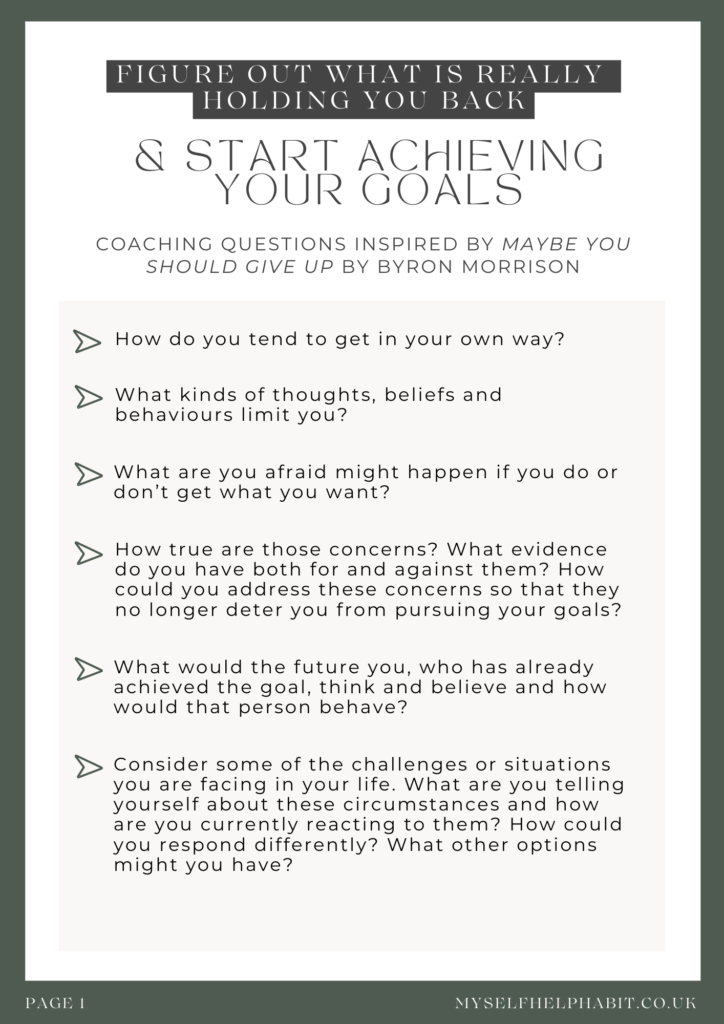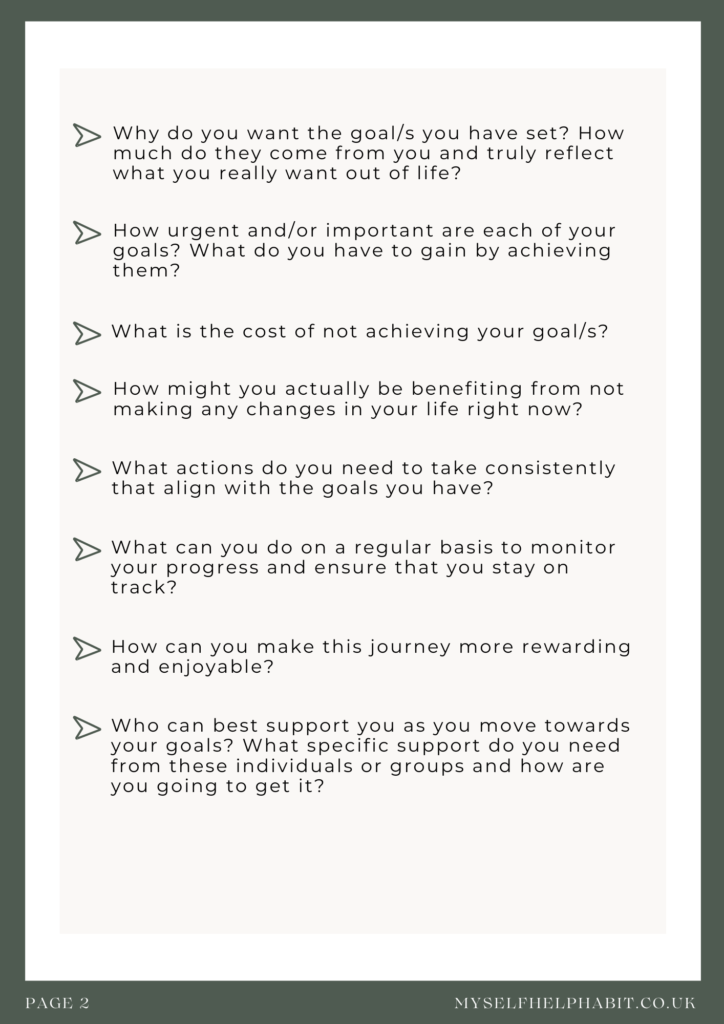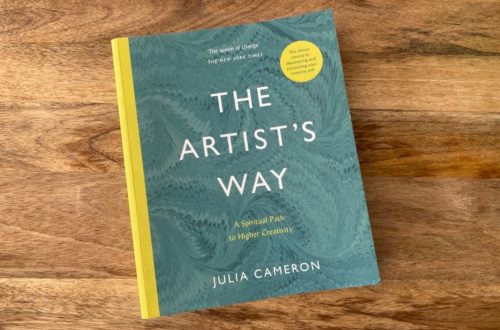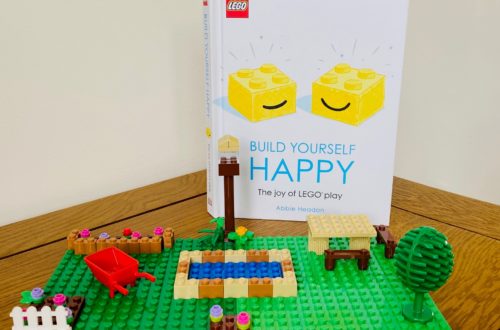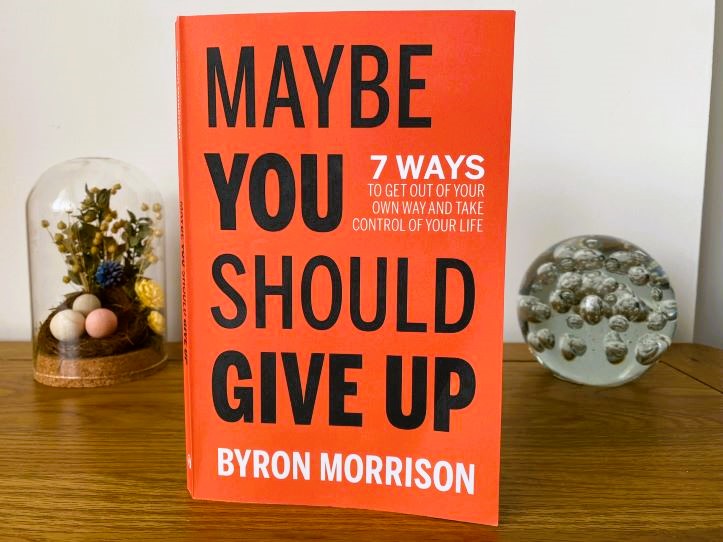
Thinking about giving up on your goals? Read this first!
Ever wondered why your goals sometimes fall by the wayside or the journey towards them just feels like a continual uphill struggle even though you would really love to achieve them? This is where Byron Morrison’s brand new book, Maybe You Should Give Up*, can help! Byron is a mindset and high performance coach and author of The Effective CEO and CEO In Control. Byron kindly provided me with an advanced copy of Maybe You Should Give Up*, which is out in bookstores on 27 June.
*Disclosure: If you buy books linked to my site, I may earn a commission from Bookshop.org, whose fees support independent bookshops.
At first glance Maybe You Should Give Up* seems like a rather provocative title for a self-help book, a contrast to the more optimistic and motivational titles that we expect to see in this genre. However, this book is not about giving up in the sense of abandoning all your goals and resigning yourself to your fate! It is about recognising and addressing the self-sabotaging thoughts and behaviours that you need to give up in order to make progress and achieve your goals.
The book is structured into the Boulders, Rocks and Pebbles that represent the common mental barriers we often encounter as we set off on our journey towards our goals. These barriers include:
- The boulders that get in your way and prevent you from taking any (or the right) kind of action, these are our fears and being reactive instead of responsive.
- The rocks we carry around that slow us down such as prioritising instant gratification, fixating on future predicaments (i.e. what could go wrong rather than what could go right!), and social comparison.
- The pebbles that make our steps more painful and arduous. This includes being too hard on ourselves and delaying our happiness in the pursuit of our goals.
The aim of this book is to help you to free yourself of these heavy and cumbersome rocks thereby making the journey to your goals a lot smoother and way more enjoyable!
One thing I appreciated about the book is that it feels like Byron is with you all the way and shares his own as well as his client’s challenges. It could be very easy to dismiss the messages in the book as ‘easier said than done’ but Byron does not underestimate just how much intention and practice it takes to address these mental barriers and reiterates throughout the book that he knows that it is not an instantaneous process and, refreshingly, does not promise the reader any rapid, overnight transformation.
Towards the end of each chapter, Byron guides you through plenty of implementable steps to overcoming the mental barriers presented in the book. You will come away with awareness of the common ways of thinking and behaving that hold you back and, importantly, you will be able to do something about them!
My Top Takeaways from Maybe You Should Give Up
To give you a flavour of the book, here are some key nuggets of wisdom that I am taking away with me. You can also download and go through the free list of coaching questions, inspired by my reading of Maybe You Should Give Up*, if you suspect that you might be getting in your own way!
- Expect that your brain will not be entirely on board with your plans for change! As Byron explains, your brain’s job is to keep you alive and therefore it is going to avoid anything remotely threatening. It wants you to keep doing the things that are familiar and comfortable to you (even if these things are not actually good for you). This is why when you start to make a change in your life or attempt something new you may yourself flooded with doubts, worries and limiting thoughts that then prevent you from doing anything at all. So, when you set out on your goals, expect that there will be some resistance along the way and recognise it for what it is, a mechanism for keeping you in safe and familiar territory (which may not be conducive to your personal growth). For me, it has been a case of learning to take action despite all the protests coming from my mind!
- You can choose your response to situations – Are you reacting impulsively or responding carefully to what is happening around you? Life throws lots of things at us and when pursuing goals we will come across plenty of hurdles but we have a choice about what we do about the circumstances we find ourselves in. This takes practice, self-awareness and the ability to centre ourselves, especially when our emotions are heightened, but it is possible to become aware of how we typically react to situations and to work on changing our reactions if they are unhelpful. We can do this by challenging the beliefs that underpin them, changing the language we use to describe our experiences, and focusing on finding alternative and more helpful ways of responding.
- Be aware of the decisions you make every day – Are your day to day decisions in alignment with the goals you have and who you want to be? Byron makes the point that ‘most of the small decisions we make today are designed to make us feel good in the short term – often at the expense of success in the long-term’ (p.55). You may get off track now and again but if you are regularly putting aside the actions you need to take towards your goals for some short-term gain, or just because it seems easier, then you will struggle to achieve them. Our brains prioritise instant gratification and so we don’t tend to put our focus on how much we are going to benefit in the long-term if we give up on the habits that prevent us from reaching our goals. So, as Byron recommends, do all you can to remind yourself of the future gains associated with your goals. Get clear on why those things are so important to you and who you need to be to achieve your goals. Vision boards, visualisation exercises or future-self journalling can be great for this!
- Own your goals – Make sure the goals that you are pursuing are really what you want and have not been heavily influenced by ‘shoulds’, FOMO, or comparison with others. The goals you have need to be motivational and meaningful to you. Spend time getting to know what you like, start to notice the things in your day that bring you joy and really pique your interest, and take some time to consider what you want in each area of your life. This will help to keep you laser focused on what matters to you and then you are less likely to be bothered by what others are doing!
- Acknowledge how far you have come and what you have managed to achieve – It can be easy for you to become disheartened and to lose sight of the progress you have already made when you are focusing so much on attaining your end goal. Give yourself some credit for what you have managed to accomplish so far, actively reflect on and track your progress, and make time to celebrate your wins.
- Don’t wait until you have achieved a goal to allow yourself to be happy – This is a good life lesson all round! It is so easy to get into a habit of thinking, ‘I’ll be happy when…[I reach that goal, etc.]’ that you simply forget that you can be happy right now! Gratitude journalling, mindfulness, noting down three good things (no matter how small) that happened in the day, prioritising your own needs, scheduling in some relaxing and fun activities, will all help you to savour and find appreciation for what you have in your life right now.
- Find people who can support you on your journey – Making changes in your life can be really challenging so it is important that you pull together your own cheerleading squad to help keep you going, especially if you have people in your life who may not be entirely supportive of your goals. You could explore mentoring, 1-1 coaching, joining classes or support groups that relate to your goals, or scheduling in regular catch-ups with a friend who is willing to support you.
Maybe You Should Give Up* is a great read for people who really want to make changes in their lives but are getting fed up with their lack of progress and are coming up against the mental barriers mentioned in the book. Byron ensures that you come away with more helpful ways of thinking and useful questions and exercises that will enable you to work through such challenges and achieve your goals. If nothing else the book will reassure you that these barriers are experienced by many of us and that you are far from alone!
There will also be ongoing support for people who purchase the book. A free video series will be available to help you to apply what you have learned from the book and you will have the option to join Byron’s Facebook community to keep yourself accountable.
Find out more about Byron’s work by visiting www.byronmorrison.com.


